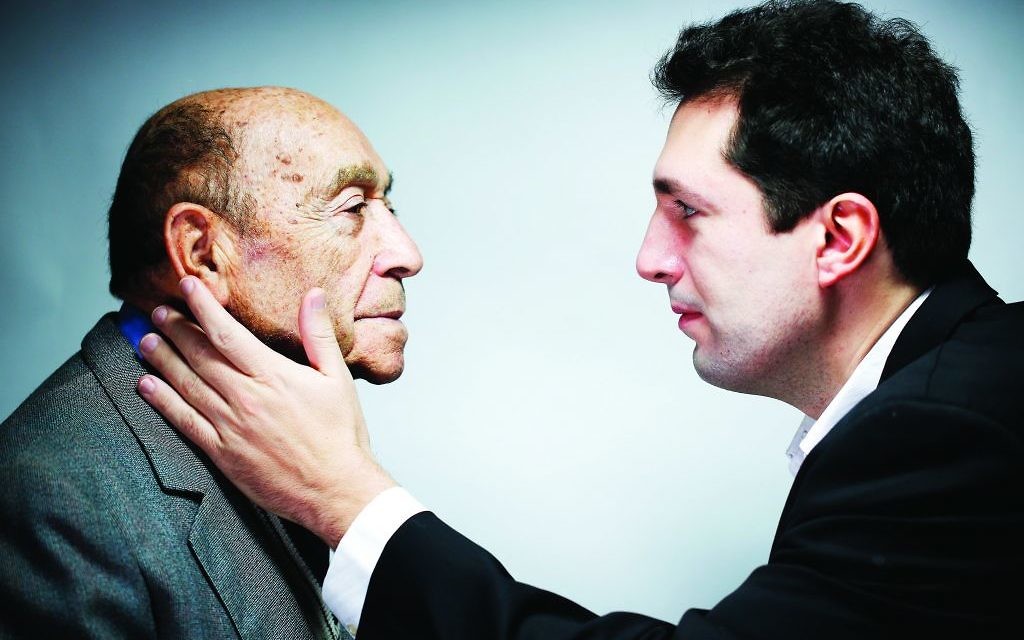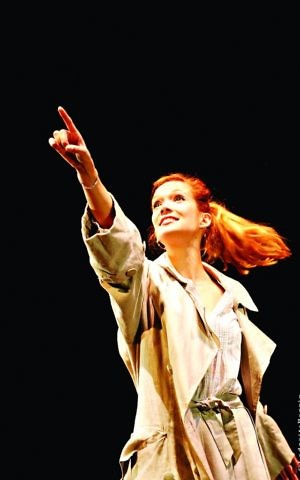A tale of Shoah survival thanks to a musical gift
We talk to director Gerald Garutti about his play based on the life of a talented violinist who survived the hell of the death camps
Like many others who survived, Haïm Lipsky remains haunted by memories of the Holocaust. Now aged 94 and living in Haifa, the Polish-born survivor seldom speaks about his wartime experiences and – had it not been for a stage production based on his life – few would ever know how the talented violinist was forced to play accompaniments to the hanging of innocent prisoners at a concentration camp in Poznan, or survived thanks to the scant remnants of food thrown to him by Polish guards after playing Christmas carols for them.
Indeed, his recollections of playing in the orchestra at Auschwitz or on the Death March to Germany would have been lost forever.
But when French-Jewish director Gerald Garutti was told about Lipsky’s incredible tale of survival, he knew instantly that his story needed to be saved for posterity.
Get The Jewish News Daily Edition by email and never miss our top stories Free Sign Up
“I regarded it as a necessity, as a testimony to Holocaust history. In a way, it was my responsibility to do this,” says Garutti, writer and director of Haïm – In The Light Of A Violin, which has been translated by Christopher Hampton and premieres in the UK this weekend at the Print Room in Notting Hill.
The production, which combines narrative (as told by French actress Mélanie Doutey) with classical and klezmer music, was a four-year labour of love for Garutti and has already enjoyed sell-out performances in Paris and Switzerland. He first came across the story after meeting Lipsky’s daughter, Shifra, in 2008.
Feeling a compulsion to start working on the project, Garutti admits he was concerned about adapting Haim’s haunting experiences into a play.
“How is it possible to say that which it is impossible to say on stage?” reflects Garutti, who directed Notes From Underground at the Print Room in 2014. “What was important to me is that the audience were connected to the roots of this extraordinary story.”
To do so, Garutti needed to speak to Lipsky first-hand.
A few initial meetings, organised during visits to Israel to see his family from France, unfortunately yielded few details.
“The only thing he said about Auschwitz was that he got away from it. I tried to ask him more, but I didn’t want to push him back into those dark places. He was far more open to speaking about the happier moments of his life, before the war.”
Of the latter, Lipsky told him about his early life growing up in a Chasidic family. The youngest of eight children, he was just a child when he developed a love for classical music, particularly the violin. He recalled sneaking into concerts at the Lodz Philharmonic Orchestra, so that he could listen to the great performers of the time, such as Arthur Rubinstein, Bronislav Hubermann and Joseph Szigeti.
As related in the play, after the outbreak of the Second World War, the young teenager and his family were forced into the Lodz ghetto. Lipsky’s musical talent got him accepted into the adult orchestra of the ghetto, conducted by the great pianist Teodor Ryder – and so began the one constant in his life that would see him survive through moments of suppression, brutality and death: his violin.
Garutti undertook an immense amount of research, looking through testimonies of survivors and their families, to try to explore the years about which Lipsky could not speak, prompting the director to explain that the play has been written with “words, music and silence”.
He also garnered information from Lipsky’s daughter and grandson, Naaman Sluchin, who has inherited Lipsky’s musical talent as a violinist and was part of the cast after the show first opened.
Following the war, Lipsky moved to Israel with his new wife and two changes occured. Emotionally wounded by his experiences and having lost his entire family, except one brother, Lipsky decided to reject his native language, Polish, and give up his beloved violin.
But when he retired from his career as an electrician, Lipsky returned to his childhood passion and today plays in the Technion Symphony Orchestra. His son is a cellist and conductor, while Shifra is also a violinist and former member of the Israel Philharmonic Orchestra. Of his five grandchildren, all are musical and two are internationally renowned.
“At first it seemed like this would be an impossible project, but we have all been amazed by the production’s success and how it has resonated with audiences,” adds Garutti.
“I believe that is down to the story being about someone who not only survived the Holocaust, but who has done so thanks to his passion for music, which gives meaning to life.”
• Haïm – In The Light Of A Violin runs from 11 to 21 June at the Print Room at the Coronet, Notting Hill Gate, London. Tickets: 020 3642 6606 or www.the-print-room.org

Thank you for helping to make Jewish News the leading source of news and opinion for the UK Jewish community. Today we're asking for your invaluable help to continue putting our community first in everything we do.
For as little as £5 a month you can help sustain the vital work we do in celebrating and standing up for Jewish life in Britain.
Jewish News holds our community together and keeps us connected. Like a synagogue, it’s where people turn to feel part of something bigger. It also proudly shows the rest of Britain the vibrancy and rich culture of modern Jewish life.
You can make a quick and easy one-off or monthly contribution of £5, £10, £20 or any other sum you’re comfortable with.
100% of your donation will help us continue celebrating our community, in all its dynamic diversity...
Engaging
Being a community platform means so much more than producing a newspaper and website. One of our proudest roles is media partnering with our invaluable charities to amplify the outstanding work they do to help us all.
Celebrating
There’s no shortage of oys in the world but Jewish News takes every opportunity to celebrate the joys too, through projects like Night of Heroes, 40 Under 40 and other compelling countdowns that make the community kvell with pride.
Pioneering
In the first collaboration between media outlets from different faiths, Jewish News worked with British Muslim TV and Church Times to produce a list of young activists leading the way on interfaith understanding.
Campaigning
Royal Mail issued a stamp honouring Holocaust hero Sir Nicholas Winton after a Jewish News campaign attracted more than 100,000 backers. Jewish Newsalso produces special editions of the paper highlighting pressing issues including mental health and Holocaust remembrance.
Easy access
In an age when news is readily accessible, Jewish News provides high-quality content free online and offline, removing any financial barriers to connecting people.
Voice of our community to wider society
The Jewish News team regularly appears on TV, radio and on the pages of the national press to comment on stories about the Jewish community. Easy access to the paper on the streets of London also means Jewish News provides an invaluable window into the community for the country at large.
We hope you agree all this is worth preserving.
-
By Laurent Vaughan - Senior Associate (Bishop & Sewell Solicitors)
-
By Laurent Vaughan - Senior Associate (Bishop & Sewell Solicitors)
-
By Laurent Vaughan - Senior Associate (Bishop & Sewell Solicitors)
-
By Laurent Vaughan - Senior Associate (Bishop & Sewell Solicitors)























